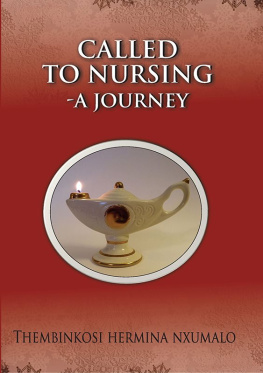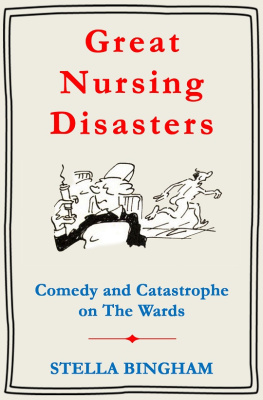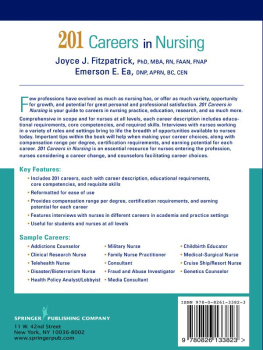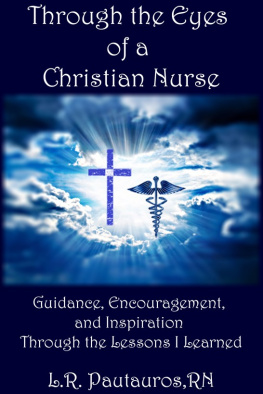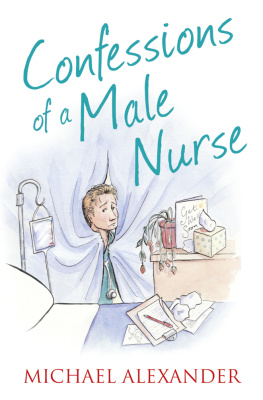Called to Nursing:
A Journey
Copyright 2018 by Xitsombe Publishing Services
All rights reserved. No part of this publication may be reproduced, distributed, or transmitted in any form or by any means, including photocopying, recording, taping or by any information storage retrieval system or other electronic or mechanical methods, without the prior written permission of the publisher, except in the case of brief quotations embodied in critical reviews. For permission requests, write to the publisher, addressed Attention: Permissions Coordinator, at the address below.
Xitsombe Publishing Services
P.O Box 10841
Vorna Valley
Midrand
1686
South Africa
Email address:
Tel: +27 65 535 3882
Because of the dynamic nature of the internet, any web addresses and links contained in this book may have changed since publication and may no longer be valid. The views expressed in this work are solely those of the author and do not necessarily reflect the views of the publisher, and the publisher hereby disclaims any responsibility for them.
ISBN number: 978-0-6208-0557-5
eISBN: 978-0-6208055-8-2
FOREWORD
It fills me with so much joy to read a book titled Called to Nursing: A Journey, written by my former colleague, Thembinkosi Hermina Nxumalo, sharing her experiences as she traversed the profession that does not only constitute the backbone of health services but regarded as the noblest profession in the world. The fact that our paths did cross while she walked this journey, fans my pleasure. As I recall how well Thembinkosi performed at all platforms of the service to which I was concurrently exposed, pride surges through my being. It is therefore with great joy that I accede to her request to write this foreword. The most beautiful aspect about this book is that Thembinkosi has fully lived the content of the journey that is described and she is the one telling us about her progression from the humble beginnings to the upper echelons of health services.
My first encounter with the Author was in 1979 while I was working for the Department of Agriculture as a Home Economics Advisor. I had visited Hlabisa on a business mission. My first impressions of her were that while she commanded respect, she also respected any person entering her office; she was very resourceful and had a pleasant disposition. Legislation, policies, standards, quality assurance, goals, mission statement, objectives and other concepts formed part of her common language to colleagues while she also had the ability to come down to any persons level.
Thembinkosi has been part of the evolution of professional nursing and its approach from the autocratic to democratic, military to humanistic, and from only having dependent functions versus independent and interdependent functions; from being subservient to medical practitioners to being instrumental and complementary in the carrying out of nursing duties and rendering of medical care; as well as the shift from the non-ownership of a patient to co-ownership of a patient with the medical practitioner.
It is my belief that those who have been called to the nursing profession, aspirant nurse professionals and professional neophytes of the discipline will learn a lot from Thembinkosis book. Subjects such as nursing administration at all levels of the service (including nursing inspection); how to develop evaluation instruments and tools; formulation of nursing policies and standards; promulgation of legislation (e.g. Nursing Acts); primary health care (versus institutional care); how political systems can impinge on the functioning of a health service; the practical knowledge and application of Labour Relations prescripts (versus only theoretical knowledge); importance of coordination, collaboration, inter-sectoral links; how to manage a service within an operating context of limited resources; intra-Governmental links and external networks; patient resuscitation; disaster management; amalgamation of services belonging to different health authorities, etc.
In view of the author being still able to think and communicate clearly, apart from reading the book, the reader has an opportunity to directly seek and get clarification about some aspects of the content; and to also obtain some knowledge that could not form part of the content as it would be impossible to incorporate all the authors life experiences into the book.
The book also challenges the nursing professionals who hoard their wealth of experience-based knowledge, worthy of being shared and waste its value to the disadvantage of our future generations. The latter statement is analogous with Thomas Greys ...flower born to blush unseen and wastes its sweetness on the dessert air in his Elegy written in the country church yard.
The values reflected in Thembinkosi Herminas book about her nursing journey appear still deeply embedded in her, making me conclude that she was bound to achieve success in her career, retiring from it positioned at the apex of its hierarchical structure. She has set an example worthy of being emulated by those who have heeded to call to the health care profession, those aspiring to be nurse professionals and those who have just commenced their potentially tedious journey as Nurse Practitioners.
Ntombifuthi Wanda M. Mthembu, PhD (Nursing)
ACKNOWLEDGMENTS
I have been fortunate in my life to have had a strong support system, in the form of parents, family, colleagues and friends. I wish to pay tribute to these people:
Firstly, my parents who made me who I am, and instilled solid ethical values that have sustained me throughout my life. I am most grateful to them. They were always there to support and guide me in my lifes journey. May they rest in peace.
Secondly, my family, both my children Benjamin and Linda, and their families, who supported me and accepted my demanding work schedules and regular absence from home. I also thank my daughter Linda Bond, who helped in proof reading this book and helped organize some of the information. My grandchildren Michael, Luis and Jason who introduced me to modern technology and taught me typing skills, and were tolerant of my mistakes as I captured this work into the computer.
Thirdly, the book would not have been what it is without the input of my colleagues and friends. I wish to acknowledge the following dear souls Mrs Dudu Biyela who helped me with some of the information of Hlabisa Hospital, Mrs Esper Gumede who gave me some of the information on Edendale strikes, Mrs Mpume Kunene who helped me with some of the information on KwaZulu Natal health facilities, Mrs N.C. Majola who assisted me with information on Nursing Education at Edendale College, Dr Luis E. Maracha Igarza who helped me with information from medical journals, Mrs Daphne Memela who helped me with some information on the functioning of the KwaZulu government, Mrs Dorcas Mbeje who helped me with information on the Pietermaritzburg Seven Day war, Mrs Mary Moleko who went out of her way to provide me with information and research reports relevant to various chapters of the book, Mr Jabulani Mhlongo who gave me information and insights on political violence, Mrs Sibongile Sibisi who assisted me and was very helpful with providing information and the chronology of the important events in the KwaZulu Department of Health, Mrs Zandile Sibiya for assisting me with information on applicable legislation, and Ms Makhosi Temba who helped me with information on the origins of northern Zululand Mission Hospitals.
Over and above the people mentioned above, some dear colleagues also provided encouragement and very valuable advice, Dr Wanda Mthembu who agreed to write the foreword for my book, Mrs Zanele Ndwandwe who encouraged me to write my life story and helped me with TB research information, Bishop Dr Nkosinathi Ndwandwe who helped me with great ideas of how to start writing this book, Professor Otte Nxumalo who encouraged me to start writing and provided the much required inspiration for this work.

